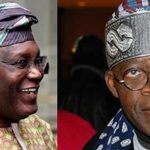June 12 holds an indelible place in the political history of Nigeria. It marks a significant milestone that altered the course of the nation’s democracy and shaped its political development. The events surrounding the June 12, 1993 presidential election and its aftermath had a profound impact on Nigeria’s political landscape.
In this article, TVC News Senior Executive, Digital and Social Media, Wasiu Salami examines the significance of June 12 in Nigeria’s political history, the consequences it had on the country’s democratic journey, and its enduring legacy.
The 1993 Presidential Election: A Watershed Moment
The 1993 presidential election was a defining moment for Nigeria’s political landscape. The election presented an opportunity for the nation to transition to civilian rule after years of military dictatorship. Chief Moshood Kashimawo Olawale Abiola, the candidate of the Social Democratic Party (SDP), and Alhaji Bashir Tofa, representing the National Republican Convention (NRC), emerged as the leading contenders.
The Mandate of the People: A Cry for Democracy
The election witnessed an unprecedented level of popular participation and enthusiasm across Nigeria. It transcended ethnic, religious, and regional divides, as millions of Nigerians saw in Chief Abiola a leader capable of unifying the country and addressing its socio-economic challenges. The overwhelming mandate given to Abiola on June 12, 1993, reflected the people’s desire for democracy, good governance, and progress.
The Annulment: A Betrayal of Democracy
Despite the transparent and credible nature of the election, General Ibrahim Babangida’s military regime controversially annulled the results. This decision triggered nationwide outrage and protests, as Nigerians felt their democratic aspirations were callously disregarded. The annulment of June 12, 1993, was widely perceived as a betrayal of the people’s will and a setback for Nigeria’s democratic progress.
The Struggle for Democracy: A Nation United
The annulment of the June 12 election sparked a protracted struggle for democracy and political reform in Nigeria. Civil society organizations, pro-democracy activists, and human rights advocates joined forces, demanding the restoration of the people’s mandate and an end to military rule. The movement, characterized by peaceful protests, strikes, and advocacy campaigns, showcased the resilience and determination of Nigerians in their fight for democracy.
Transition to Democracy: The Legacy of June 12
The struggle for the actualization of June 12 and the restoration of democracy in Nigeria persisted even after Chief Abiola’s untimely death in detention in 1998. The collective efforts of Nigerians ultimately led to the transition from military to civilian rule in 1999, with the election of President Olusegun Obasanjo. This historic moment marked the culmination of years of activism and signaled a renewed hope for a democratic Nigeria.
June 12’s significance lies not only in its role as a catalyst for democratic transition but also in its enduring legacy. It symbolizes the resilience, tenacity, and unwavering commitment of Nigerians to the principles of democracy, justice, and accountability. The sacrifices made by Chief Abiola, other pro-democracy activists, and ordinary citizens inspire generations to engage actively in the political process and demand transparency and good governance.
Moreover, June 12 serves as a reminder of the importance of unity in Nigeria’s diverse society. The election demonstrated that Nigerians could transcend ethnic, religious, and regional differences to unite behind a common vision of a democratic and prosperous nation. The spirit of June 12 continues to resonate today, encouraging dialogue, inclusivity, and nation-building efforts across Nigeria.
Conclusion
June 12 is a watershed moment in Nigeria’s political history, marking a turning point in the nation’s democratic journey. The events surrounding the 1993 presidential election and its annulment galvanized Nigerians to demand democracy, leading to a transition from military to civilian rule. The legacy of June 12 endures through the pursuit of good governance, accountability, and unity. As Nigeria continues to navigate its political development, it is vital to remember and draw inspiration from the significance of June 12, ensuring that the ideals it represents remain integral to the nation’s future.
June 12 holds an indelible place in the political history of Nigeria. It marks a significant milestone that altered the course of the nation’s democracy and shaped its political development. The events surrounding the June 12, 1993 presidential election and its aftermath had a profound impact on Nigeria’s political landscape.
In this article, TVC News Senior Executive, Digital and Social Media, Wasiu Salami examines the significance of June 12 in Nigeria’s political history, the consequences it had on the country’s democratic journey, and its enduring legacy.
The 1993 Presidential Election: A Watershed Moment
The 1993 presidential election was a defining moment for Nigeria’s political landscape. The election presented an opportunity for the nation to transition to civilian rule after years of military dictatorship. Chief Moshood Kashimawo Olawale Abiola, the candidate of the Social Democratic Party (SDP), and Alhaji Bashir Tofa, representing the National Republican Convention (NRC), emerged as the leading contenders.
The Mandate of the People: A Cry for Democracy
The election witnessed an unprecedented level of popular participation and enthusiasm across Nigeria. It transcended ethnic, religious, and regional divides, as millions of Nigerians saw in Chief Abiola a leader capable of unifying the country and addressing its socio-economic challenges. The overwhelming mandate given to Abiola on June 12, 1993, reflected the people’s desire for democracy, good governance, and progress.
The Annulment: A Betrayal of Democracy
Despite the transparent and credible nature of the election, General Ibrahim Babangida’s military regime controversially annulled the results. This decision triggered nationwide outrage and protests, as Nigerians felt their democratic aspirations were callously disregarded. The annulment of June 12, 1993, was widely perceived as a betrayal of the people’s will and a setback for Nigeria’s democratic progress.
The Struggle for Democracy: A Nation United
The annulment of the June 12 election sparked a protracted struggle for democracy and political reform in Nigeria. Civil society organizations, pro-democracy activists, and human rights advocates joined forces, demanding the restoration of the people’s mandate and an end to military rule. The movement, characterized by peaceful protests, strikes, and advocacy campaigns, showcased the resilience and determination of Nigerians in their fight for democracy.
Transition to Democracy: The Legacy of June 12
The struggle for the actualization of June 12 and the restoration of democracy in Nigeria persisted even after Chief Abiola’s untimely death in detention in 1998. The collective efforts of Nigerians ultimately led to the transition from military to civilian rule in 1999, with the election of President Olusegun Obasanjo. This historic moment marked the culmination of years of activism and signaled a renewed hope for a democratic Nigeria.
June 12’s significance lies not only in its role as a catalyst for democratic transition but also in its enduring legacy. It symbolizes the resilience, tenacity, and unwavering commitment of Nigerians to the principles of democracy, justice, and accountability. The sacrifices made by Chief Abiola, other pro-democracy activists, and ordinary citizens inspire generations to engage actively in the political process and demand transparency and good governance.
Moreover, June 12 serves as a reminder of the importance of unity in Nigeria’s diverse society. The election demonstrated that Nigerians could transcend ethnic, religious, and regional differences to unite behind a common vision of a democratic and prosperous nation. The spirit of June 12 continues to resonate today, encouraging dialogue, inclusivity, and nation-building efforts across Nigeria.
Conclusion
June 12 is a watershed moment in Nigeria’s political history, marking a turning point in the nation’s democratic journey. The events surrounding the 1993 presidential election and its annulment galvanized Nigerians to demand democracy, leading to a transition from military to civilian rule. The legacy of June 12 endures through the pursuit of good governance, accountability, and unity. As Nigeria continues to navigate its political development, it is vital to remember and draw inspiration from the significance of June 12, ensuring that the ideals it represents remain integral to the nation’s future.
June 12 holds an indelible place in the political history of Nigeria. It marks a significant milestone that altered the course of the nation’s democracy and shaped its political development. The events surrounding the June 12, 1993 presidential election and its aftermath had a profound impact on Nigeria’s political landscape.
In this article, TVC News Senior Executive, Digital and Social Media, Wasiu Salami examines the significance of June 12 in Nigeria’s political history, the consequences it had on the country’s democratic journey, and its enduring legacy.
The 1993 Presidential Election: A Watershed Moment
The 1993 presidential election was a defining moment for Nigeria’s political landscape. The election presented an opportunity for the nation to transition to civilian rule after years of military dictatorship. Chief Moshood Kashimawo Olawale Abiola, the candidate of the Social Democratic Party (SDP), and Alhaji Bashir Tofa, representing the National Republican Convention (NRC), emerged as the leading contenders.
The Mandate of the People: A Cry for Democracy
The election witnessed an unprecedented level of popular participation and enthusiasm across Nigeria. It transcended ethnic, religious, and regional divides, as millions of Nigerians saw in Chief Abiola a leader capable of unifying the country and addressing its socio-economic challenges. The overwhelming mandate given to Abiola on June 12, 1993, reflected the people’s desire for democracy, good governance, and progress.
The Annulment: A Betrayal of Democracy
Despite the transparent and credible nature of the election, General Ibrahim Babangida’s military regime controversially annulled the results. This decision triggered nationwide outrage and protests, as Nigerians felt their democratic aspirations were callously disregarded. The annulment of June 12, 1993, was widely perceived as a betrayal of the people’s will and a setback for Nigeria’s democratic progress.
The Struggle for Democracy: A Nation United
The annulment of the June 12 election sparked a protracted struggle for democracy and political reform in Nigeria. Civil society organizations, pro-democracy activists, and human rights advocates joined forces, demanding the restoration of the people’s mandate and an end to military rule. The movement, characterized by peaceful protests, strikes, and advocacy campaigns, showcased the resilience and determination of Nigerians in their fight for democracy.
Transition to Democracy: The Legacy of June 12
The struggle for the actualization of June 12 and the restoration of democracy in Nigeria persisted even after Chief Abiola’s untimely death in detention in 1998. The collective efforts of Nigerians ultimately led to the transition from military to civilian rule in 1999, with the election of President Olusegun Obasanjo. This historic moment marked the culmination of years of activism and signaled a renewed hope for a democratic Nigeria.
June 12’s significance lies not only in its role as a catalyst for democratic transition but also in its enduring legacy. It symbolizes the resilience, tenacity, and unwavering commitment of Nigerians to the principles of democracy, justice, and accountability. The sacrifices made by Chief Abiola, other pro-democracy activists, and ordinary citizens inspire generations to engage actively in the political process and demand transparency and good governance.
Moreover, June 12 serves as a reminder of the importance of unity in Nigeria’s diverse society. The election demonstrated that Nigerians could transcend ethnic, religious, and regional differences to unite behind a common vision of a democratic and prosperous nation. The spirit of June 12 continues to resonate today, encouraging dialogue, inclusivity, and nation-building efforts across Nigeria.
Conclusion
June 12 is a watershed moment in Nigeria’s political history, marking a turning point in the nation’s democratic journey. The events surrounding the 1993 presidential election and its annulment galvanized Nigerians to demand democracy, leading to a transition from military to civilian rule. The legacy of June 12 endures through the pursuit of good governance, accountability, and unity. As Nigeria continues to navigate its political development, it is vital to remember and draw inspiration from the significance of June 12, ensuring that the ideals it represents remain integral to the nation’s future.
June 12 holds an indelible place in the political history of Nigeria. It marks a significant milestone that altered the course of the nation’s democracy and shaped its political development. The events surrounding the June 12, 1993 presidential election and its aftermath had a profound impact on Nigeria’s political landscape.
In this article, TVC News Senior Executive, Digital and Social Media, Wasiu Salami examines the significance of June 12 in Nigeria’s political history, the consequences it had on the country’s democratic journey, and its enduring legacy.
The 1993 Presidential Election: A Watershed Moment
The 1993 presidential election was a defining moment for Nigeria’s political landscape. The election presented an opportunity for the nation to transition to civilian rule after years of military dictatorship. Chief Moshood Kashimawo Olawale Abiola, the candidate of the Social Democratic Party (SDP), and Alhaji Bashir Tofa, representing the National Republican Convention (NRC), emerged as the leading contenders.
The Mandate of the People: A Cry for Democracy
The election witnessed an unprecedented level of popular participation and enthusiasm across Nigeria. It transcended ethnic, religious, and regional divides, as millions of Nigerians saw in Chief Abiola a leader capable of unifying the country and addressing its socio-economic challenges. The overwhelming mandate given to Abiola on June 12, 1993, reflected the people’s desire for democracy, good governance, and progress.
The Annulment: A Betrayal of Democracy
Despite the transparent and credible nature of the election, General Ibrahim Babangida’s military regime controversially annulled the results. This decision triggered nationwide outrage and protests, as Nigerians felt their democratic aspirations were callously disregarded. The annulment of June 12, 1993, was widely perceived as a betrayal of the people’s will and a setback for Nigeria’s democratic progress.
The Struggle for Democracy: A Nation United
The annulment of the June 12 election sparked a protracted struggle for democracy and political reform in Nigeria. Civil society organizations, pro-democracy activists, and human rights advocates joined forces, demanding the restoration of the people’s mandate and an end to military rule. The movement, characterized by peaceful protests, strikes, and advocacy campaigns, showcased the resilience and determination of Nigerians in their fight for democracy.
Transition to Democracy: The Legacy of June 12
The struggle for the actualization of June 12 and the restoration of democracy in Nigeria persisted even after Chief Abiola’s untimely death in detention in 1998. The collective efforts of Nigerians ultimately led to the transition from military to civilian rule in 1999, with the election of President Olusegun Obasanjo. This historic moment marked the culmination of years of activism and signaled a renewed hope for a democratic Nigeria.
June 12’s significance lies not only in its role as a catalyst for democratic transition but also in its enduring legacy. It symbolizes the resilience, tenacity, and unwavering commitment of Nigerians to the principles of democracy, justice, and accountability. The sacrifices made by Chief Abiola, other pro-democracy activists, and ordinary citizens inspire generations to engage actively in the political process and demand transparency and good governance.
Moreover, June 12 serves as a reminder of the importance of unity in Nigeria’s diverse society. The election demonstrated that Nigerians could transcend ethnic, religious, and regional differences to unite behind a common vision of a democratic and prosperous nation. The spirit of June 12 continues to resonate today, encouraging dialogue, inclusivity, and nation-building efforts across Nigeria.
Conclusion
June 12 is a watershed moment in Nigeria’s political history, marking a turning point in the nation’s democratic journey. The events surrounding the 1993 presidential election and its annulment galvanized Nigerians to demand democracy, leading to a transition from military to civilian rule. The legacy of June 12 endures through the pursuit of good governance, accountability, and unity. As Nigeria continues to navigate its political development, it is vital to remember and draw inspiration from the significance of June 12, ensuring that the ideals it represents remain integral to the nation’s future.
June 12 holds an indelible place in the political history of Nigeria. It marks a significant milestone that altered the course of the nation’s democracy and shaped its political development. The events surrounding the June 12, 1993 presidential election and its aftermath had a profound impact on Nigeria’s political landscape.
In this article, TVC News Senior Executive, Digital and Social Media, Wasiu Salami examines the significance of June 12 in Nigeria’s political history, the consequences it had on the country’s democratic journey, and its enduring legacy.
The 1993 Presidential Election: A Watershed Moment
The 1993 presidential election was a defining moment for Nigeria’s political landscape. The election presented an opportunity for the nation to transition to civilian rule after years of military dictatorship. Chief Moshood Kashimawo Olawale Abiola, the candidate of the Social Democratic Party (SDP), and Alhaji Bashir Tofa, representing the National Republican Convention (NRC), emerged as the leading contenders.
The Mandate of the People: A Cry for Democracy
The election witnessed an unprecedented level of popular participation and enthusiasm across Nigeria. It transcended ethnic, religious, and regional divides, as millions of Nigerians saw in Chief Abiola a leader capable of unifying the country and addressing its socio-economic challenges. The overwhelming mandate given to Abiola on June 12, 1993, reflected the people’s desire for democracy, good governance, and progress.
The Annulment: A Betrayal of Democracy
Despite the transparent and credible nature of the election, General Ibrahim Babangida’s military regime controversially annulled the results. This decision triggered nationwide outrage and protests, as Nigerians felt their democratic aspirations were callously disregarded. The annulment of June 12, 1993, was widely perceived as a betrayal of the people’s will and a setback for Nigeria’s democratic progress.
The Struggle for Democracy: A Nation United
The annulment of the June 12 election sparked a protracted struggle for democracy and political reform in Nigeria. Civil society organizations, pro-democracy activists, and human rights advocates joined forces, demanding the restoration of the people’s mandate and an end to military rule. The movement, characterized by peaceful protests, strikes, and advocacy campaigns, showcased the resilience and determination of Nigerians in their fight for democracy.
Transition to Democracy: The Legacy of June 12
The struggle for the actualization of June 12 and the restoration of democracy in Nigeria persisted even after Chief Abiola’s untimely death in detention in 1998. The collective efforts of Nigerians ultimately led to the transition from military to civilian rule in 1999, with the election of President Olusegun Obasanjo. This historic moment marked the culmination of years of activism and signaled a renewed hope for a democratic Nigeria.
June 12’s significance lies not only in its role as a catalyst for democratic transition but also in its enduring legacy. It symbolizes the resilience, tenacity, and unwavering commitment of Nigerians to the principles of democracy, justice, and accountability. The sacrifices made by Chief Abiola, other pro-democracy activists, and ordinary citizens inspire generations to engage actively in the political process and demand transparency and good governance.
Moreover, June 12 serves as a reminder of the importance of unity in Nigeria’s diverse society. The election demonstrated that Nigerians could transcend ethnic, religious, and regional differences to unite behind a common vision of a democratic and prosperous nation. The spirit of June 12 continues to resonate today, encouraging dialogue, inclusivity, and nation-building efforts across Nigeria.
Conclusion
June 12 is a watershed moment in Nigeria’s political history, marking a turning point in the nation’s democratic journey. The events surrounding the 1993 presidential election and its annulment galvanized Nigerians to demand democracy, leading to a transition from military to civilian rule. The legacy of June 12 endures through the pursuit of good governance, accountability, and unity. As Nigeria continues to navigate its political development, it is vital to remember and draw inspiration from the significance of June 12, ensuring that the ideals it represents remain integral to the nation’s future.
June 12 holds an indelible place in the political history of Nigeria. It marks a significant milestone that altered the course of the nation’s democracy and shaped its political development. The events surrounding the June 12, 1993 presidential election and its aftermath had a profound impact on Nigeria’s political landscape.
In this article, TVC News Senior Executive, Digital and Social Media, Wasiu Salami examines the significance of June 12 in Nigeria’s political history, the consequences it had on the country’s democratic journey, and its enduring legacy.
The 1993 Presidential Election: A Watershed Moment
The 1993 presidential election was a defining moment for Nigeria’s political landscape. The election presented an opportunity for the nation to transition to civilian rule after years of military dictatorship. Chief Moshood Kashimawo Olawale Abiola, the candidate of the Social Democratic Party (SDP), and Alhaji Bashir Tofa, representing the National Republican Convention (NRC), emerged as the leading contenders.
The Mandate of the People: A Cry for Democracy
The election witnessed an unprecedented level of popular participation and enthusiasm across Nigeria. It transcended ethnic, religious, and regional divides, as millions of Nigerians saw in Chief Abiola a leader capable of unifying the country and addressing its socio-economic challenges. The overwhelming mandate given to Abiola on June 12, 1993, reflected the people’s desire for democracy, good governance, and progress.
The Annulment: A Betrayal of Democracy
Despite the transparent and credible nature of the election, General Ibrahim Babangida’s military regime controversially annulled the results. This decision triggered nationwide outrage and protests, as Nigerians felt their democratic aspirations were callously disregarded. The annulment of June 12, 1993, was widely perceived as a betrayal of the people’s will and a setback for Nigeria’s democratic progress.
The Struggle for Democracy: A Nation United
The annulment of the June 12 election sparked a protracted struggle for democracy and political reform in Nigeria. Civil society organizations, pro-democracy activists, and human rights advocates joined forces, demanding the restoration of the people’s mandate and an end to military rule. The movement, characterized by peaceful protests, strikes, and advocacy campaigns, showcased the resilience and determination of Nigerians in their fight for democracy.
Transition to Democracy: The Legacy of June 12
The struggle for the actualization of June 12 and the restoration of democracy in Nigeria persisted even after Chief Abiola’s untimely death in detention in 1998. The collective efforts of Nigerians ultimately led to the transition from military to civilian rule in 1999, with the election of President Olusegun Obasanjo. This historic moment marked the culmination of years of activism and signaled a renewed hope for a democratic Nigeria.
June 12’s significance lies not only in its role as a catalyst for democratic transition but also in its enduring legacy. It symbolizes the resilience, tenacity, and unwavering commitment of Nigerians to the principles of democracy, justice, and accountability. The sacrifices made by Chief Abiola, other pro-democracy activists, and ordinary citizens inspire generations to engage actively in the political process and demand transparency and good governance.
Moreover, June 12 serves as a reminder of the importance of unity in Nigeria’s diverse society. The election demonstrated that Nigerians could transcend ethnic, religious, and regional differences to unite behind a common vision of a democratic and prosperous nation. The spirit of June 12 continues to resonate today, encouraging dialogue, inclusivity, and nation-building efforts across Nigeria.
Conclusion
June 12 is a watershed moment in Nigeria’s political history, marking a turning point in the nation’s democratic journey. The events surrounding the 1993 presidential election and its annulment galvanized Nigerians to demand democracy, leading to a transition from military to civilian rule. The legacy of June 12 endures through the pursuit of good governance, accountability, and unity. As Nigeria continues to navigate its political development, it is vital to remember and draw inspiration from the significance of June 12, ensuring that the ideals it represents remain integral to the nation’s future.
June 12 holds an indelible place in the political history of Nigeria. It marks a significant milestone that altered the course of the nation’s democracy and shaped its political development. The events surrounding the June 12, 1993 presidential election and its aftermath had a profound impact on Nigeria’s political landscape.
In this article, TVC News Senior Executive, Digital and Social Media, Wasiu Salami examines the significance of June 12 in Nigeria’s political history, the consequences it had on the country’s democratic journey, and its enduring legacy.
The 1993 Presidential Election: A Watershed Moment
The 1993 presidential election was a defining moment for Nigeria’s political landscape. The election presented an opportunity for the nation to transition to civilian rule after years of military dictatorship. Chief Moshood Kashimawo Olawale Abiola, the candidate of the Social Democratic Party (SDP), and Alhaji Bashir Tofa, representing the National Republican Convention (NRC), emerged as the leading contenders.
The Mandate of the People: A Cry for Democracy
The election witnessed an unprecedented level of popular participation and enthusiasm across Nigeria. It transcended ethnic, religious, and regional divides, as millions of Nigerians saw in Chief Abiola a leader capable of unifying the country and addressing its socio-economic challenges. The overwhelming mandate given to Abiola on June 12, 1993, reflected the people’s desire for democracy, good governance, and progress.
The Annulment: A Betrayal of Democracy
Despite the transparent and credible nature of the election, General Ibrahim Babangida’s military regime controversially annulled the results. This decision triggered nationwide outrage and protests, as Nigerians felt their democratic aspirations were callously disregarded. The annulment of June 12, 1993, was widely perceived as a betrayal of the people’s will and a setback for Nigeria’s democratic progress.
The Struggle for Democracy: A Nation United
The annulment of the June 12 election sparked a protracted struggle for democracy and political reform in Nigeria. Civil society organizations, pro-democracy activists, and human rights advocates joined forces, demanding the restoration of the people’s mandate and an end to military rule. The movement, characterized by peaceful protests, strikes, and advocacy campaigns, showcased the resilience and determination of Nigerians in their fight for democracy.
Transition to Democracy: The Legacy of June 12
The struggle for the actualization of June 12 and the restoration of democracy in Nigeria persisted even after Chief Abiola’s untimely death in detention in 1998. The collective efforts of Nigerians ultimately led to the transition from military to civilian rule in 1999, with the election of President Olusegun Obasanjo. This historic moment marked the culmination of years of activism and signaled a renewed hope for a democratic Nigeria.
June 12’s significance lies not only in its role as a catalyst for democratic transition but also in its enduring legacy. It symbolizes the resilience, tenacity, and unwavering commitment of Nigerians to the principles of democracy, justice, and accountability. The sacrifices made by Chief Abiola, other pro-democracy activists, and ordinary citizens inspire generations to engage actively in the political process and demand transparency and good governance.
Moreover, June 12 serves as a reminder of the importance of unity in Nigeria’s diverse society. The election demonstrated that Nigerians could transcend ethnic, religious, and regional differences to unite behind a common vision of a democratic and prosperous nation. The spirit of June 12 continues to resonate today, encouraging dialogue, inclusivity, and nation-building efforts across Nigeria.
Conclusion
June 12 is a watershed moment in Nigeria’s political history, marking a turning point in the nation’s democratic journey. The events surrounding the 1993 presidential election and its annulment galvanized Nigerians to demand democracy, leading to a transition from military to civilian rule. The legacy of June 12 endures through the pursuit of good governance, accountability, and unity. As Nigeria continues to navigate its political development, it is vital to remember and draw inspiration from the significance of June 12, ensuring that the ideals it represents remain integral to the nation’s future.
June 12 holds an indelible place in the political history of Nigeria. It marks a significant milestone that altered the course of the nation’s democracy and shaped its political development. The events surrounding the June 12, 1993 presidential election and its aftermath had a profound impact on Nigeria’s political landscape.
In this article, TVC News Senior Executive, Digital and Social Media, Wasiu Salami examines the significance of June 12 in Nigeria’s political history, the consequences it had on the country’s democratic journey, and its enduring legacy.
The 1993 Presidential Election: A Watershed Moment
The 1993 presidential election was a defining moment for Nigeria’s political landscape. The election presented an opportunity for the nation to transition to civilian rule after years of military dictatorship. Chief Moshood Kashimawo Olawale Abiola, the candidate of the Social Democratic Party (SDP), and Alhaji Bashir Tofa, representing the National Republican Convention (NRC), emerged as the leading contenders.
The Mandate of the People: A Cry for Democracy
The election witnessed an unprecedented level of popular participation and enthusiasm across Nigeria. It transcended ethnic, religious, and regional divides, as millions of Nigerians saw in Chief Abiola a leader capable of unifying the country and addressing its socio-economic challenges. The overwhelming mandate given to Abiola on June 12, 1993, reflected the people’s desire for democracy, good governance, and progress.
The Annulment: A Betrayal of Democracy
Despite the transparent and credible nature of the election, General Ibrahim Babangida’s military regime controversially annulled the results. This decision triggered nationwide outrage and protests, as Nigerians felt their democratic aspirations were callously disregarded. The annulment of June 12, 1993, was widely perceived as a betrayal of the people’s will and a setback for Nigeria’s democratic progress.
The Struggle for Democracy: A Nation United
The annulment of the June 12 election sparked a protracted struggle for democracy and political reform in Nigeria. Civil society organizations, pro-democracy activists, and human rights advocates joined forces, demanding the restoration of the people’s mandate and an end to military rule. The movement, characterized by peaceful protests, strikes, and advocacy campaigns, showcased the resilience and determination of Nigerians in their fight for democracy.
Transition to Democracy: The Legacy of June 12
The struggle for the actualization of June 12 and the restoration of democracy in Nigeria persisted even after Chief Abiola’s untimely death in detention in 1998. The collective efforts of Nigerians ultimately led to the transition from military to civilian rule in 1999, with the election of President Olusegun Obasanjo. This historic moment marked the culmination of years of activism and signaled a renewed hope for a democratic Nigeria.
June 12’s significance lies not only in its role as a catalyst for democratic transition but also in its enduring legacy. It symbolizes the resilience, tenacity, and unwavering commitment of Nigerians to the principles of democracy, justice, and accountability. The sacrifices made by Chief Abiola, other pro-democracy activists, and ordinary citizens inspire generations to engage actively in the political process and demand transparency and good governance.
Moreover, June 12 serves as a reminder of the importance of unity in Nigeria’s diverse society. The election demonstrated that Nigerians could transcend ethnic, religious, and regional differences to unite behind a common vision of a democratic and prosperous nation. The spirit of June 12 continues to resonate today, encouraging dialogue, inclusivity, and nation-building efforts across Nigeria.
Conclusion
June 12 is a watershed moment in Nigeria’s political history, marking a turning point in the nation’s democratic journey. The events surrounding the 1993 presidential election and its annulment galvanized Nigerians to demand democracy, leading to a transition from military to civilian rule. The legacy of June 12 endures through the pursuit of good governance, accountability, and unity. As Nigeria continues to navigate its political development, it is vital to remember and draw inspiration from the significance of June 12, ensuring that the ideals it represents remain integral to the nation’s future.














